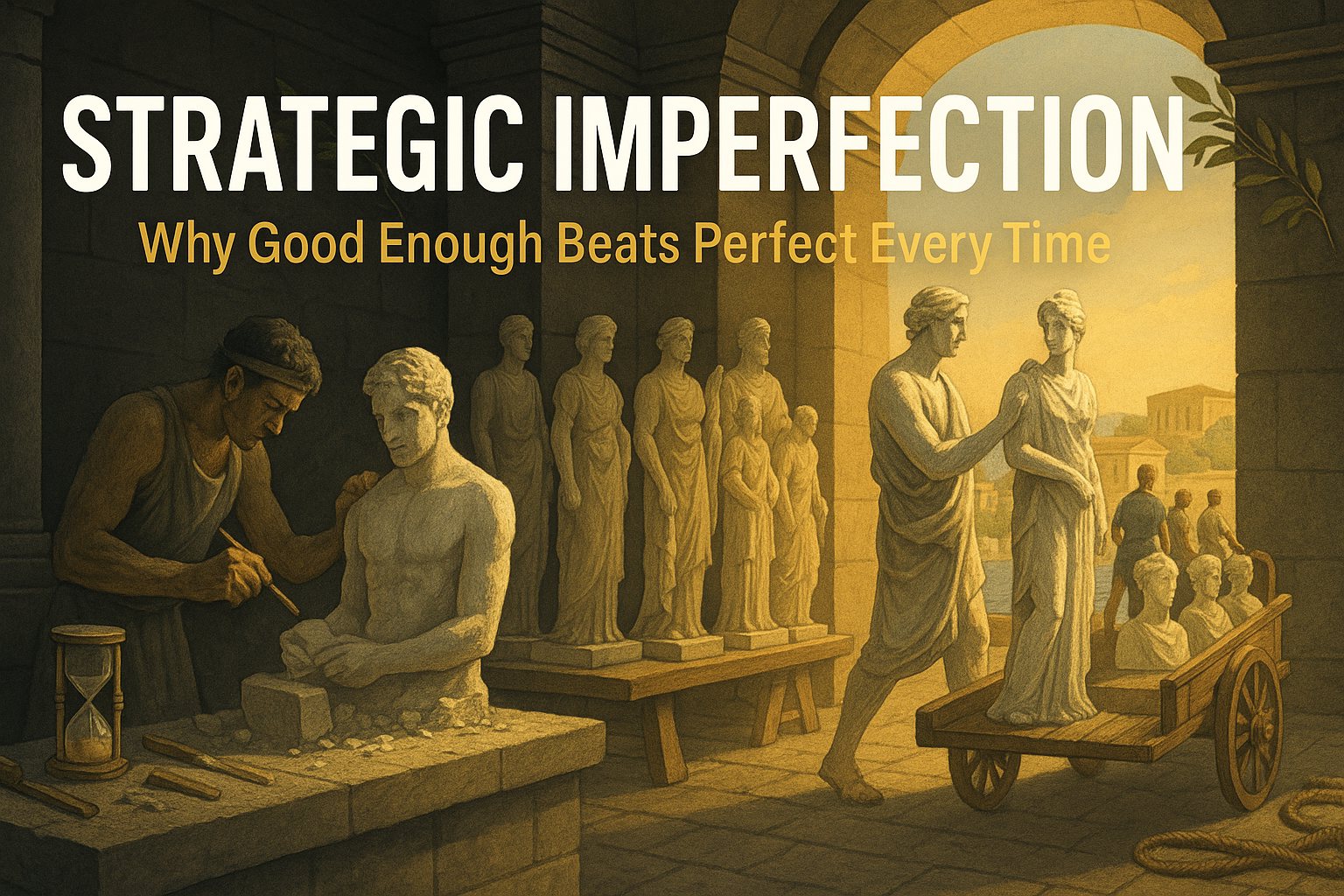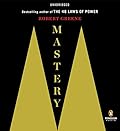
Strategic Imperfection: Why Good Enough Beats Perfect Every Time
By Derek Neighbors on September 8, 2025
I worked for a leader who had one answer to everything: “We’re going to be world class.”
World class code. World class design. World class process. Everything had to be world class.
Nothing ever shipped. Ever.
Because “world class” was his shield against judgment. Every time something was ready to go out the door, suddenly it wasn’t world class enough. “It’s not ready yet.” Always not ready.
We had a product ready to launch, six months of work, customers waiting, revenue on the line. Three days before launch, he killed it. “Not world class enough.” The competition shipped their basic version two weeks later and owned the market.
The man who talked most about excellence created an environment where excellence was impossible.
He wasn’t pursuing world class anything. He was terrified of putting work into the world and being judged for it. “World class” was just fear wearing a fancy suit.
The Perfectionism Delusion
Most people mistake perfectionism for high standards. They think the pursuit of flawless execution demonstrates commitment to excellence. This is bullshit wrapped in noble language.
The truth: Perfectionism is fear wearing the mask of quality.
Real excellence knows when to stop improving and start shipping. It’s the wisdom to recognize that 80% done and in the world beats 100% done and sitting on your hard drive.
The ancient Greeks understood kairos, the right or opportune moment for action. Sometimes the perfect moment for imperfect action beats the imperfect moment for perfect action.
The Lies We Tell Ourselves
“I have high standards.” Bullshit. You’re terrified of being judged, so you keep polishing until you run out of time, then blame circumstances.
“It’s not ready yet.” The perfectionist’s favorite lie. Aristotle understood that excellence is a practice, not a state. Every day you don’t ship is a day your competitor gets closer to shipping.
“People will judge me if it’s not perfect.” This is the opposite of andreia (courage). True courage ships imperfect work because the mission matters more than your reputation.
What Actually Works
Excellence isn’t hoarding effort like a dragon. It’s wielding it where it cuts deepest.
The turning point: asking “Is this good enough to serve its purpose?” instead of “Is this perfect?”
The Book I Never Published
For three years, I worked on “Adapt or Die”, a book about what happens when organizations can’t transform.
The book was 60% done for two years. Always “not quite ready yet.”
The irony is brutal: I wrote a book about organizations that die because they can’t adapt, then killed the book because I couldn’t adapt my standards to reality.
It’s still sitting in my drafts folder. Perfect and useless.
The Tension You Can’t Avoid
“Good enough” isn’t always good enough. Sometimes you ship too early and damage trust.
phronesis is knowing what level of imperfection serves the mission versus what level betrays it.
The question: Am I shipping because I’m ready to learn, or because I’m tired of working?
The Risk I’m Not Telling You About
Strategic imperfection can become laziness. There’s a difference between shipping strategically imperfect work and shipping work you’re ashamed of.
The line: Does this imperfection serve the user’s journey, or just your desire to be done?
The Challenge
Here’s your challenge: Ship something imperfect this week.
Pick a project you’ve been “perfecting” for too long. Something that’s good enough to serve its purpose but not perfect enough to satisfy your ego.
Set a deadline. Tomorrow, this weekend, next Tuesday—whatever forces you to ship before you’re “ready.”
Then do the hardest part: release it into the world knowing it’s not perfect and being okay with that.
But here’s the crucial part: track one specific lesson from the feedback you get. Not just “people liked it” or “it could be better.” What did you learn about what actually matters to the people you’re trying to serve?
That lesson is the difference between performative discomfort and actual growth. The discomfort you feel? That’s not the work failing. That’s perfectionism dying and wisdom being born.
The Ancient Wisdom Connection
Aristotle wrote about the golden mean, the virtuous balance between extremes. In creation, the extremes are sloppiness and perfectionism. Strategic imperfection is the golden mean: caring enough to do good work, wise enough to know when to stop.
The ancients understood that arete (excellence) is a way of being, not a state of completion. You don’t achieve excellence by creating perfect things. You achieve excellence by consistently creating good things and getting better through practice.
Marcus Aurelius, the most powerful man in the world, wrote: “What brings no benefit to the hive brings no benefit to the bee.” He understood that individual perfection means nothing if it prevents collective progress.
The emperor who could have demanded perfection from everyone chose instead to ship his imperfect thoughts in the Meditations, daily reflections never meant for publication. He didn’t ship them for his ego. He shipped them because unshared wisdom serves no hive. Those imperfect writings became one of history’s most influential works on excellence because they served human flourishing, not imperial vanity.
The Deeper Cost: Living Against Your Values
But here’s what perfectionism really costs: it separates you from what you actually value.
Every perfectionist I know claims to value excellence, but their actions serve fear. They say they want to help people, but they won’t release imperfect help. They talk about creating value, but they hoard their work until it’s “worthy.”
This isn’t alignment with excellence. This is using excellence as an excuse to avoid the vulnerability of service.
eudaimonia (human flourishing) comes from living in alignment with your deepest values. If you value helping others, then shipping imperfect help serves that value better than perfecting unused solutions. If you value learning, then releasing work that gets feedback serves that value better than polishing work that never gets tested.
The perfectionist thinks they’re honoring excellence. But they’re actually dishonoring their deeper purpose by making their ego more important than their mission.
When Strategic Imperfection Betrayed Me
But here’s the story that makes me uncomfortable: strategic imperfection can betray you too.
Last year, I shipped a feature that was “good enough” by my standards but broke for 30% of users. I’d convinced myself that the core functionality worked, so the edge cases could wait. The feedback was brutal. Not just about the bugs, but about the trust I’d damaged by shipping something I knew wasn’t ready.
That’s when I learned the hardest lesson about phronesis: it’s not just knowing when to ship imperfect work. It’s knowing what kind of imperfection serves the mission versus what kind betrays it.
The surgeon can’t embrace “strategic imperfection” on the incision. The pilot can’t ship “good enough” on the landing. But the writer can ship an imperfect first draft, and the entrepreneur can launch with missing features.
The difference? Some imperfections teach. Others kill.
The Courage to Ship
Strategic imperfection requires andreia (courage), not the courage to charge into battle, but the courage to be judged.
The world doesn’t need your perfect solution to imaginary problems. It needs your good solution to real problems.
The Shameless Shipper Problem
I’ve worked with leaders who flood the market with garbage, calling it “strategic imperfection.” They’re practicing laziness with a philosophy degree.
phronesis asks: “What does this person need from me?” Shameless shipping asks: “What’s the least I can do?”
One serves flourishing. The other serves ego.
Done Beats Perfect
Done beats perfect, shipped beats polished, progress beats paralysis.
Not because done is better than perfect, but because perfect never ships.
Your imperfect work in the world beats your perfect work in your head every time.
Final Thoughts
This reveals something fundamental about human nature and excellence.
We live in a culture that sells perfectionism as virtue. But transformation happens when you realize that the right imperfection doesn’t limit you, it liberates you.
The person who chooses strategic imperfection never needs endless polishing.
They have something better: the freedom that comes from knowing exactly what’s worth perfecting and what’s worth shipping.
That’s the difference between perfectionism masquerading as standards and authentic excellence through strategic action.
Ready to break free from perfectionism and embrace strategic imperfection? MasteryLab.co provides frameworks for sustainable progress and the community support to ship your imperfect work with confidence.



